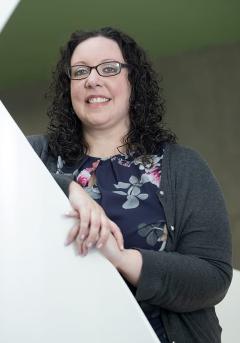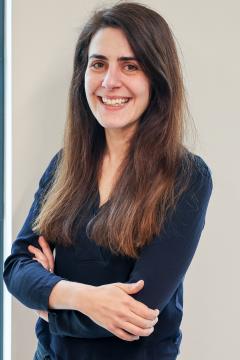[08/03/23] Bayes Centre News: International Women's Day 2023: An interview with three leading women in our Executive Group
International Women’s Day takes place every year on 8th of March. International Women’s Day celebrates the social, economic, cultural, and political accomplishments of women worldwide. To celebrate International Women’s Day this year, we spoke to three leading women in our Executive Group about their roles at the Bayes Centre and about what this year’s theme #EmbraceEquity means to them.
Head of Programmes, Rhona Hajcman
Can you tell me a bit about your role at the Bayes Centre?
As Head of Programmes, I am responsible for resource allocation and programme delivery across a portfolio of skills, research and entrepreneurship activities. I track progress against operational plans, timelines and growth targets as well as to track Bayes contribution to the institution wide Data Driven Innovation programme.

What has been your proudest achievement whilst working in your current role as Head of Programmes | Deputy Chief Operating Officer?
I have been in this post for two months and the Bayes Centre team have made me feel very welcome. I am happy with how quickly I have been able to learn about the inner workings of the Bayes Centre and how it fits into the wider University. I am proud that I have a role to play at the Bayes Executive Group and can utilise my knowledge and experience of the higher education sector to provide professional guidance and advice to senior colleagues.
Why do you think it’s important to celebrate International Women’s Day?
International Women’s Day is an opportunity to celebrate achievements of women all around the world. It is also a time to recognise where there are still gender gaps and to recognise what we can do as individuals to promote equality.
This year’s International Women’s Day theme is Embrace Equity. What does this mean to you?
The theme of Embrace Equity is a call to action to get the world talking about “why equal opportunities are no longer enough” and why gender equity is what we should be seeking, rather than equality. While these words are used interchangeably there is a difference and it is an important reminder that giving everyone the same opportunities may not help everyone to thrive to achieve the same goals. In my previous role working in Admissions, I saw the University of Edinburgh’s widening participation policy strive for equity for candidates from disadvantaged backgrounds. The Embrace Equity theme is a helpful reminder to think about individuals having different circumstances and that they might need different resources and opportunities to reach the same goals.
Director of Data Science Education, Teresa Ironside, MBA
Can you tell me a bit about your role at the Bayes Centre?
Within my role as Director of Data Science Education, I am responsible for the Education remit within the Bayes Centre from a strategic management

perspective, with a focus on Talent development within the Data Driven Innovation (DDI) programme. I lead on collaborative data science training and DDI initiatives within the College of Science and Engineering, working across the University and with affiliated partners. I am on a number of steering committees and contribute to initiatives across the University related to student administration management and student experience, while also representing the interests of Bayes Education and our vision to build an empowered workforce with the capability to implement effective data science and artificial intelligence solutions.
I oversee the current interdisciplinary online learning suite of programmes in Data Science, Technology and Innovation (DSTI) and Data Upskilling Short Courses (DUSC), both growing portfolios of courses contributed from all three Colleges across the University in the sciences, humanities and medicine, working collaboratively with DDI Hubs. They give working professionals the opportunity to study and upskill while they work or provide opportunities for those who are unemployed and looking to reskill. These range from short courses, to a postgraduate certificate, diploma, and masters level degrees.
I also lead on partnership development, implementation, and delivery of educational offerings and lead the cross-DDI Data Science Education Centre of Excellence, which aims to provide a focal point for current and planned data science education and training across the University to gain a better understanding of existing content, regulatory, software, process limitations and planned growth in order to help quickly leverage opportunities as the University of Edinburgh develops data science activities.
What has been your proudest achievement whilst working in your role as Director of Data Science Education?
I am really proud of the collaborative educational programmes we have developed and currently deliver, which offer non-traditional options for people to study with the University, enabling them to work while they study which often provides significant economic benefits to our region while also having a wider global impact. I used this experience, knowledge, and the skills gained through this work to co-lead on the Technology Enhanced Learning (TEL) project for the College of Science and Engineering at the start of the initial lockdown in March 2020. The aim of this project was to quickly pivot the teaching practice within the College of Engineering to ensure minimal disruption to students during COVID-19 while also offering training and infrastructure support for staff and influencing decisions which impacted on teaching in order to support teaching staff, professional services staff, and technical staff, all of whom were represented and active on the project.
This project was awarded the University of Edinburgh’s Principal’s Medal in 2020 for exceptional contribution, recognising the team’s successful support and delivery of the radical change in education needed during the Covid-19 response, while also maintaining the link with established teaching practice. I was really proud that this work was recognised in this way and that all members contributing to this work were recognised. It was a fantastic example of what could be achieved through effective collaboration and a desire to succeed.
Why do you think it’s important to celebrate International Women’s Day?
I love hearing stories of strong women making a difference and find them really inspiring. International Women’s Day really brings these to the forefront and I hope one day we perhaps will not need a specific day to recognise all the accomplishments of women and girls around the world and it is done on a daily basis, but for now I will celebrate them!
This year’s International Women’s Day theme is Embrace Equity. What does this mean to you?
Helping others has always been a big driver within my career and I have always strived to be equitable and inclusive throughout my profession. I enjoy making a difference and found I could do this while in early administrative roles supporting senior colleagues and then students as I moved into student administration management. Now that I am in a senior position, I can help build programmes to give students and working professionals opportunities to upskill in data which is such a fast growing and emerging area. The students on our programmes come from a wide range of backgrounds and likely did not have the same starting point, education, or career journeys. We ensure that the education offerings embrace equity and diversity by supporting and championing different experiences in order to drive and achieve success and ensure we are inclusive in all our practices. It is amazing to see how the students can learn from each other’s experiences in addition to the course material being taught and we embrace this within our educational offerings.
We have a fantastic team within Bayes Education and the wider Bayes team who are really dedicated to ensuring students have a great equitable experience with us and are given inclusive opportunities to study, whether that be on short courses or onto full postgraduate degrees. In line with the theme of this year’s International Women’s Day we work hard to deliver impact through positive change giving more people opportunities.
Business Development Manager, Emily Lekkas
Can you tell me a bit about your role at the Bayes Centre?
I help companies to navigate their way through to the right solution within the university; be that finding specialist expertise in data science and AI, upskilling their staff, becoming part of our thriving tech ecosystem, or working on more strategic projects including adopting innovation.
What has been your proudest achievement whilst working in your role as Business Development Manager?

Creating a thriving, happy, supportive community of tech companies who benefit from each other and from being within a world-leading research institute
Why do you think it’s important to celebrate International Women’s Day?
Women are great. Take Jacinda Ardern – what a fantastic leader she was (and mother). People don’t always see all of the great things women achieve so I think it’s important for us to have an opportunity to shout about it through IWD!
This year’s International Women’s Day theme is Embrace Equity. What does this mean to you?
Everyone has a right to feel included, whoever they are. We shouldn’t be biased and we should always strive to be inclusive in whatever we do.

